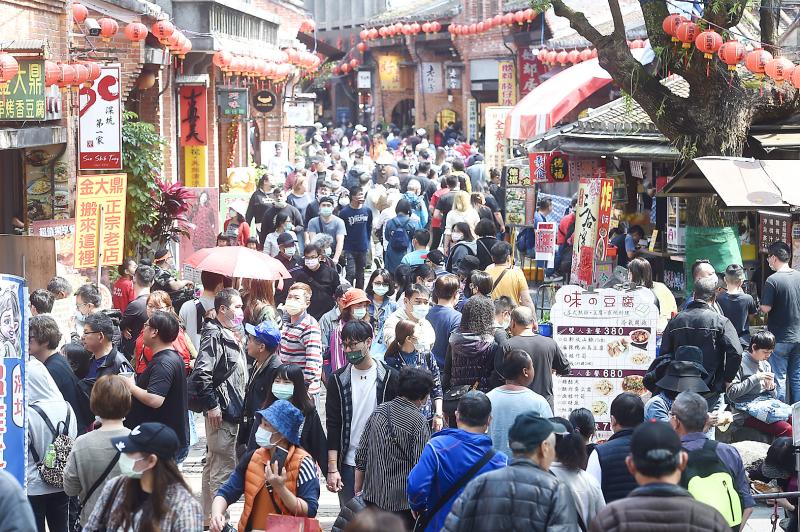Taiwan’s economy might expand 4.1 percent this year, accelerating from a 3.11 percent pickup last year, as its exports would continue to benefit from surging demand for electronics products amid and after the COVID-19 pandemic, global research body IHS Markit said yesterday.
Taiwan has been one of the world’s most resilient economies during the pandemic-triggered recession last year.
Economic indicators at the beginning of this year signal improving growth momentum for its economy over the coming months, as the global economy and trade rebounds, the US-British information provider said.

Photo: Chien Jung-feng, Taipei Times
According to the latest IHS Markit survey of business confidence in Taiwan, the 12-month outlook for manufacturing production in January rose to its highest level since April 2014, reflecting strengthening new orders, it said.
IHS Markit expects Taiwan’s exports to increase by about 13 percent this year, as global demand for electronics has recovered significantly from the lows seen in the first half of last year, when lockdowns in major countries disrupted production and consumer spending.
With an improving economic landscape worldwide following the rollout of COVID-19 vaccines, global demand for electronics products would remain sturdy, IHS Markit said.
The pandemic has sped up the pace of digital transformation for companies and organizations, a trend that underpinned the global shift to remote work and spurred demand for electronic devices, such as computers, printers and mobile phones, it said.
That helps explain why Taiwan is in the rare position of posting an increase in GDP last year, when most other economies either plunged into recession or experienced a material slowdown caused by the shockwaves of the pandemic, it added.
IHS Markit said the easing of lockdowns in many countries is facilitating a rebound in consumer spending, helping boost demand for a wide range of consumer electronics.
Therefore, electronics demand would receive further backing from major technological developments, including rollouts of the latest wireless communication technologies over the next five years, which would drive up demand for 5G smartphones, it said.
Demand for industrial electronics is also expected to grow substantially over the medium term, as industrial automation and the Internet of Things would fuel demand for industrial electronics, IHS Markit said.
Auto demand has also shown a concrete rebound after a slump in the first half of last year, which contributed to a shortage in semiconductors used in vehicles, as Taiwan is responsible for the bulk of global chip production, it said.
These factors lend support to the medium-term outlook for Taiwan’s electronics sector exports and capital expenditure, which would be key drivers of economic growth, IHS Markit said.

Sweeping policy changes under US Secretary of Health and Human Services Robert F. Kennedy Jr are having a chilling effect on vaccine makers as anti-vaccine rhetoric has turned into concrete changes in inoculation schedules and recommendations, investors and executives said. The administration of US President Donald Trump has in the past year upended vaccine recommendations, with the country last month ending its longstanding guidance that all children receive inoculations against flu, hepatitis A and other diseases. The unprecedented changes have led to diminished vaccine usage, hurt the investment case for some biotechs, and created a drag that would likely dent revenues and

Macronix International Co (旺宏), the world’s biggest NOR flash memory supplier, yesterday said it would spend NT$22 billion (US$699.1 million) on capacity expansion this year to increase its production of mid-to-low-density memory chips as the world’s major memorychip suppliers are phasing out the market. The company said its planned capital expenditures are about 11 times higher than the NT$1.8 billion it spent on new facilities and equipment last year. A majority of this year’s outlay would be allocated to step up capacity of multi-level cell (MLC) NAND flash memory chips, which are used in embedded multimedia cards (eMMC), a managed

CULPRITS: Factors that affected the slip included falling global crude oil prices, wait-and-see consumer attitudes due to US tariffs and a different Lunar New Year holiday schedule Taiwan’s retail sales ended a nine-year growth streak last year, slipping 0.2 percent from a year earlier as uncertainty over US tariff policies affected demand for durable goods, data released on Friday by the Ministry of Economic Affairs showed. Last year’s retail sales totaled NT$4.84 trillion (US$153.27 billion), down about NT$9.5 billion, or 0.2 percent, from 2024. Despite the decline, the figure was still the second-highest annual sales total on record. Ministry statistics department deputy head Chen Yu-fang (陳玉芳) said sales of cars, motorcycles and related products, which accounted for 17.4 percent of total retail rales last year, fell NT$68.1 billion, or

In the wake of strong global demand for AI applications, Taiwan’s export-oriented economy accelerated with the composite index of economic indicators flashing the first “red” light in December for one year, indicating the economy is in booming mode, the National Development Council (NDC) said yesterday. Moreover, the index of leading indicators, which gauges the potential state of the economy over the next six months, also moved higher in December amid growing optimism over the outlook, the NDC said. In December, the index of economic indicators rose one point from a month earlier to 38, at the lower end of the “red” light.